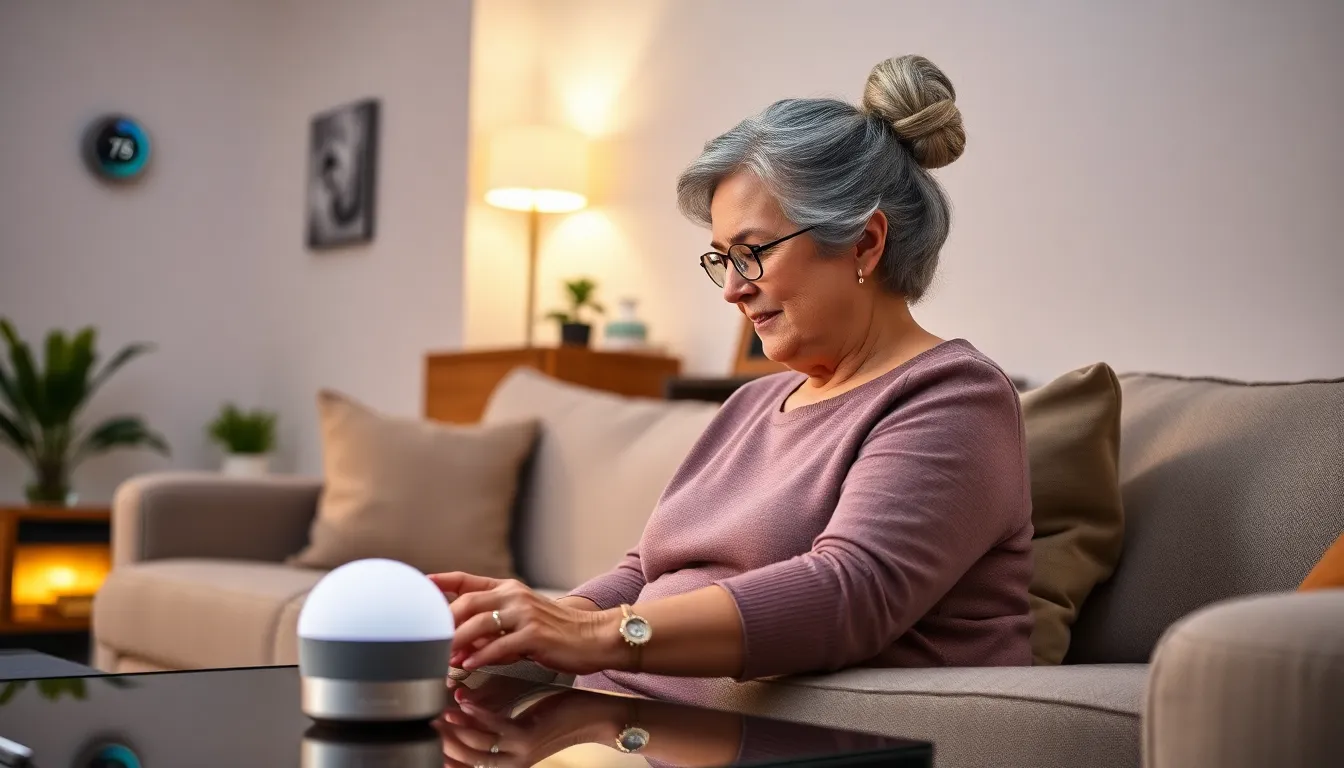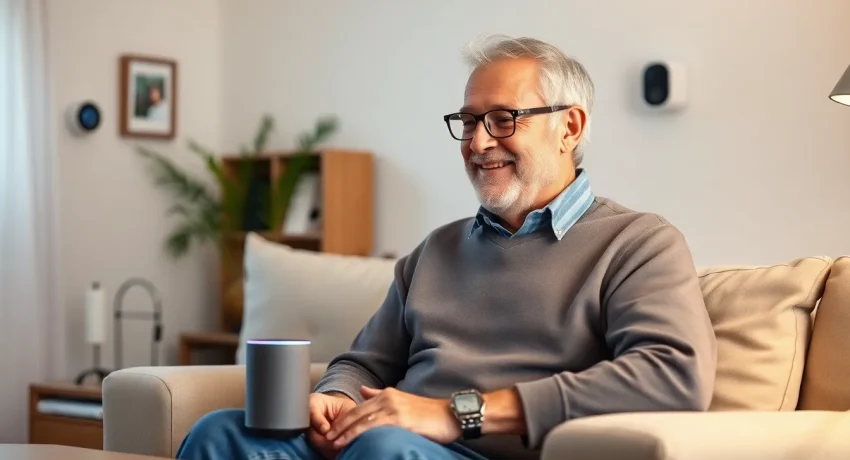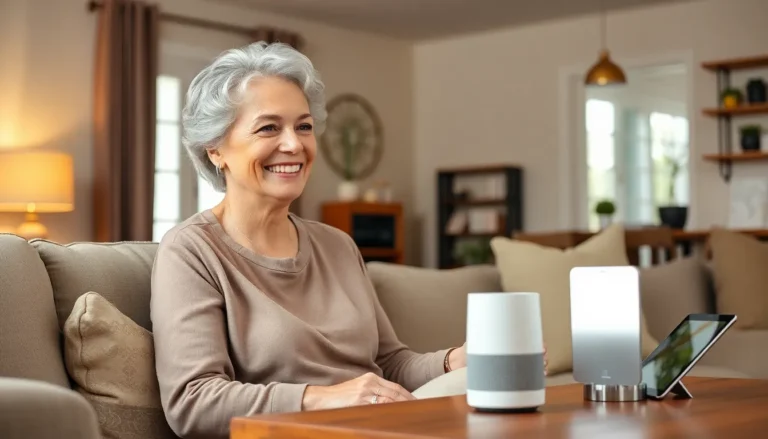Table of Contents
ToggleAs the golden years approach, many seniors find themselves navigating a world that’s increasingly tech-savvy. But fear not! Smart home devices are here to save the day, offering convenience and peace of mind without the need for a degree in computer science. Imagine a home where lights turn on with a simple voice command and security systems keep watch while you sip your tea—sounds like magic, right?
Overview of Smart Home Technology
Smart home technology integrates various devices and systems for seamless control and automation within a household. Many seniors find these technologies enhance daily living by promoting independence and safety. Device options include smart lighting, which adjusts based on occupancy, and smart locks that allow secure entry without keys.
Voice-activated assistants, such as Amazon Echo or Google Nest, facilitate hands-free operation. Seniors can easily ask for help, control devices, or check the weather with simple voice commands. Additionally, smart thermostats learn user preferences, optimizing comfort while minimizing energy costs.
Security systems equipped with motion detectors and cameras offer peace of mind. Seniors can monitor their homes in real-time, receiving alerts on smartphones or tablets. Such devices reduce the risk of unauthorized access and help family members stay informed about their loved ones’ safety.
Health monitoring devices also contribute to the smart home ecosystem. Wearable technologies track vital statistics, alerting caregivers if immediate attention is needed. Smart medication dispensers provide reminders, ensuring necessary doses are taken on time.
Integration of these technologies encourages a connected environment. By using apps or centralized control panels, seniors can manage multiple devices from one platform, simplifying daily tasks. Compatibility among devices enhances user experience, allowing individuals to build a personalized, responsive home.
Ultimately, the shift towards smart home technology reflects a growing commitment to facilitating independence for seniors. Modern solutions cater to their needs and preferences, allowing for comfortable living and a sense of security.
Importance of Smart Home Devices for Elderly

Smart home devices significantly enhance the quality of life for seniors. These technologies offer convenience and support tailored to their unique needs.
Enhancing Safety and Security
Safety measures play a crucial role in smart homes for elderly individuals. Smart locks enable secure access without the need for keys, reducing the risk of losing them. Security cameras provide continuous surveillance, ensuring that loved ones can monitor activity in and around the home. Motion sensors alert seniors to any unexpected movement, creating an extra layer of security. Automated lighting can illuminate pathways at night, preventing falls. Health monitoring devices afford additional peace of mind by tracking vital signs and notifying caregivers of potential issues. These innovations ensure that seniors are protected within their living environment.
Promoting Independence and Comfort
Independence thrives with the use of smart home technology. Voice-activated assistants, such as Amazon Echo or Google Nest, allow seniors to control devices effortlessly without physical interaction. Smart thermostats adjust temperatures based on preference and time of day, maximizing comfort with minimal effort. Appliances that can be controlled remotely enable seniors to manage tasks like cooking or laundry more easily. Furthermore, automated reminders for medication ensure seniors adhere to their health routines. These advancements not only promote autonomy but also create a more comfortable and enjoyable living space.
Best Smart Home Devices for Elderly
Smart home devices offer seniors a range of benefits, making everyday tasks easier and enhancing their quality of life. Selecting the right devices can significantly improve independence and security.
Smart Speakers and Assistants
Smart speakers like Amazon Echo and Google Home provide voice-activated control for various tasks. They allow seniors to play music, set reminders, and control other smart devices hands-free. These assistants can answer questions or provide information on demand, promoting engagement. Families can use features like drop-in calls to check-in. Integration with other home systems further enhances their capabilities.
Smart Lighting Solutions
Smart lighting options improve safety and convenience in the home. Systems like Philips Hue allow users to control lights remotely, set schedules, and adjust brightness. Motion-sensor lights automatically turn on when detecting movement, reducing the risk of falls. With the ability to create lighting scenes for different activities, seniors can enhance their living spaces effortlessly. These solutions not only save energy but also allow customization according to individual preferences.
Health and Wellness Monitors
Health monitoring devices support seniors in maintaining their well-being. Wearables like Fitbit track activity levels, heart rate, and sleep patterns, helping users stay aware of their health. Smart medication dispensers provide reminders to take pills on time, minimizing the risk of missed doses. Remote monitoring devices can alert caregivers of any concerning changes in health metrics. These tools empower seniors to manage their health effectively from home.
Home Security Systems
Home security systems enhance safety and provide peace of mind. Devices featuring smart cameras and motion detectors allow seniors to monitor their surroundings in real time. Doorbell cameras notify users when someone is at the door, ensuring they know who is visiting. Remote access enables family members to check security feeds, offering an added layer of support. Integrating alarms and locks provides comprehensive protection tailored to individual needs.
Smart Home Hubs and Controllers
Smart home hubs centralize control of various devices, simplifying operation for seniors. Platforms like Samsung SmartThings enable the integration of diverse smart technologies into one interface. User-friendly apps allow for easy monitoring and management, reducing complexity. Voice commands can streamline control over multiple devices like lights, thermostats, and locks. These hubs foster a connected environment, enhancing the overall smart home experience for elderly users.
Tips for Choosing the Right Devices
Selecting the right smart home devices for seniors involves careful consideration of specific features that enhance usability and security. These choices greatly influence daily life.
Consider User-Friendly Interfaces
User-friendly interfaces are essential for seniors who may not be tech-savvy. Devices with simple touchscreens or large buttons facilitate easy navigation. Voice commands enhance accessibility too; many smart devices respond effectively to vocal instructions. Intuitive apps allow for straightforward management of devices; they should promote an enjoyable experience. Look for products with clear instructions and reliable customer support; this provides added assurance when using technology. Numerous smart home devices offer customizable settings that cater to individual preferences, ultimately improving user engagement.
Assess Compatibility with Existing Systems
Compatibility plays a crucial role in choosing smart home devices. Ensure that new devices seamlessly integrate with existing systems; this can prevent frustrations during setup. Look for devices that support major smart home ecosystems, such as Amazon Alexa, Google Assistant, or Apple HomeKit. Checking for interoperability between devices enhances functionality; it allows for cohesive control through one app or voice assistant. Evaluate how new devices communicate with others, as this affects performance and reliability. Prioritizing compatibility ensures a connected and efficient home environment tailored to seniors’ needs.
Smart home devices are transforming the lives of seniors by providing enhanced convenience and security. These technologies not only promote independence but also ensure a safer living environment. With user-friendly interfaces and seamless integration, seniors can easily navigate their smart homes.
From voice-activated assistants to health monitoring devices, the right tools can significantly improve daily living. As more seniors embrace these innovations, the benefits of smart home technology will continue to grow. Investing in these devices is a step toward a more connected and comfortable lifestyle for elderly individuals, allowing them to enjoy their golden years with confidence and ease.




